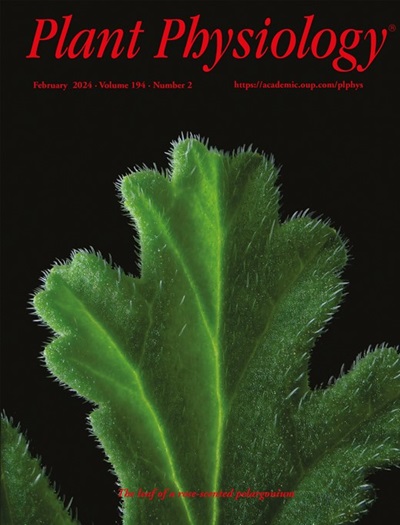The HsfA1a-BAG5b module mediates thermotolerance through activating autophagy in tomato
IF 6.9
1区 生物学
Q1 PLANT SCIENCES
引用次数: 0
Abstract
Heat shock transcription factors (Hsfs) and B-cell lymphoma2 (Bcl-2)-associated athanogene (BAG) proteins are essential for plant responses to high-temperature stress. Autophagy plays a crucial role in plant stress resistance by maintaining intracellular homeostasis. However, the mechanisms by which BAG proteins mediate Hsf-induced autophagy to enhance thermotolerance remain unclear. Here, we found that HsfA1a enhances tomato (Solanum lycopersicum L.) thermotolerance by inducing autophagy to degrade ubiquitinated proteins. HsfA1a directly binds to the BAG5b promoter to activate its expression and also interacts with BAG5b both in vitro and in vivo. The HsfA1a–BAG5b interaction enhances the HsfA1a-mediated transcriptional activation of BAG5b and the autophagy-related gene ATG10. BAG5b-overexpressing plants exhibited enhanced thermotolerance and increased autophagosome accumulation, whereas bag5b mutant plants were hypersensitive to high-temperature stress and showed inhibited autophagosome formation. Furthermore, knockout of BAG5b or ATG10 in HsfA1a-overexpressing plants compromised HsfA1a-induced thermotolerance and autophagosome formation. Taken together, our data reveal that HsfA1a promotes BAG5b expression by binding to its promoter under high-temperature stress. Subsequently, BAG5b interacts with HsfA1a to activate ATG10 expression, which promotes autophagosome formation to degrade ubiquitinated protein aggregates, ultimately enhancing tomato thermotolerance.HsfA1a-BAG5b模块通过激活番茄自噬介导耐热性
热休克转录因子(Hsfs)和b细胞淋巴瘤2 (Bcl-2)相关的无thanogene (BAG)蛋白在植物对高温胁迫的反应中是必不可少的。自噬通过维持细胞内稳态在植物抗逆性中起着至关重要的作用。然而,BAG蛋白介导hsf诱导的自噬增强耐热性的机制尚不清楚。在这里,我们发现HsfA1a通过诱导自噬降解泛素化蛋白来增强番茄(Solanum lycopersicum L.)的耐热性。HsfA1a直接结合BAG5b启动子激活其表达,并在体外和体内与BAG5b相互作用。HsfA1a-BAG5b相互作用增强了hsfa1a介导的BAG5b和自噬相关基因ATG10的转录激活。过表达bag5b的植株表现出增强的耐热性和增加的自噬体积累,而bag5b突变体植株对高温胁迫极度敏感,自噬体形成受到抑制。此外,在过表达hsfa1a的植物中敲除BAG5b或ATG10会损害hsfa1a诱导的耐热性和自噬体的形成。综上所述,我们的数据显示HsfA1a在高温胁迫下通过结合其启动子来促进BAG5b的表达。随后,BAG5b与HsfA1a相互作用,激活ATG10表达,促进自噬体形成,降解泛素化蛋白聚集体,最终增强番茄的耐热性。
本文章由计算机程序翻译,如有差异,请以英文原文为准。
求助全文
约1分钟内获得全文
求助全文
来源期刊

Plant Physiology
生物-植物科学
CiteScore
12.20
自引率
5.40%
发文量
535
审稿时长
2.3 months
期刊介绍:
Plant Physiology® is a distinguished and highly respected journal with a rich history dating back to its establishment in 1926. It stands as a leading international publication in the field of plant biology, covering a comprehensive range of topics from the molecular and structural aspects of plant life to systems biology and ecophysiology. Recognized as the most highly cited journal in plant sciences, Plant Physiology® is a testament to its commitment to excellence and the dissemination of groundbreaking research.
As the official publication of the American Society of Plant Biologists, Plant Physiology® upholds rigorous peer-review standards, ensuring that the scientific community receives the highest quality research. The journal releases 12 issues annually, providing a steady stream of new findings and insights to its readership.
 求助内容:
求助内容: 应助结果提醒方式:
应助结果提醒方式:


